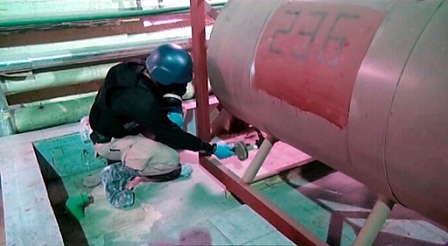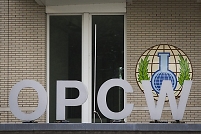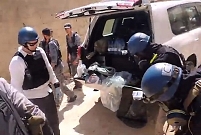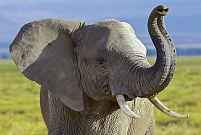Erstellt am: 11. 10. 2013 - 13:24 Uhr
Nobel Peace sur-Prize
Subscribe to the Reality Check podcast and get the whole programme after the show.
The Nobel Committee is famous for dishing up surprises. Notoriously difficult to predict, and famous for confounding the tipsters and betting agencies, the Committee has previously given the award to the vague (European Union, United Nations), the controversial (Liu Xiabo, Barack Obama) and the worthy but relatively obscure (Sherin Ebadi, Mangari Maathai). This time, they have gone for the quite simply unexpected: The Organisation for the Prohibition of Chemical Weapons.
Not a favourite, or even an also-ran
The hot favourite was Malala Yousafzai, the Pakistani teenager and campaigner for girls' rights and education, who was shot in the head by the Taliban. A few other possibilities were under speculation, including the highly controversial suggestion of Vladimir Putin.

EPA/SYRIAN TELEVISION
In the light of recent developments in Syria, perhaps the OPCW is not such a surprising choice, but the timing is still extraordinary. The public nominations for the Nobel Peace Prize close in the spring of the year in which the Prize is awarded, and given that the OPCW has only been active in Syria in the last few weeks, it seems highly likely that the nomination came from a member of the committee itself.
A warmly welcomed surprise
Whatever the timing and details of the decision making process, the choice of theOPCW is being widely welcomed, and it shining a spotlight on the unsung heroes of some very difficult situations.

EPA/EVERT-JAN DANIELS
The OPCW was founded in 1997 to police the Chemical Weapons Convention, and as international organisations of this type go, it's on the small side. It's work is mostly in the technical and rather unglamorous aspects of identifying and disposing of chemical weapons.
They had some recognition for their work in Libya back in the days when Muamar Gadaffi decided to give up his chemical weapons and try to join the International Community. Since then, their work has largely been in the background and away from the glare of the media - that was, until the last few weeks when they suddenly found themselves not only on the front line of the diplomatic efforts to tackle the issue of Syria's chemical weapons, but also on the front line of the Syrian civil war. As if their job weren't difficult enough in just finding, identifying and destroying the Syrian stockpile, they are also operating in a country more or less under seige, as the government and rebels battle for control of key regions.
The start of a long process

EPA/LOCAL COMMITEE OF ARBEEN
Although their job in Syria has only just started, and will almost certainly take months or years to complete, the progress they have made so far means they have, indeed, made very significant steps in moving Syria towards peace, and the whole region towards greater safety and stability.
Today, this typically low-profile organisation is receiving the high-profile recognition is clearly deserves.
On hearing the announcement of this year's Nobel Peace Prize, Tilman Brück of the Stockholm International Peace Research Institute, gave his reaction to Steve Crilley.
Dieses Element ist nicht mehr verfügbar
Also in Reality Check:
Reporters 2014
As aspiring journalists are entering the Die Presse Reporter '14 competition, Joanna Bostock meets Sebastien Wedl who won the Reporter Ost section two years ago.
Dieses Element ist nicht mehr verfügbar
Fair Trade gold and silver
Fair Trade coffee and clothes are already part of our lives, but now fair trade is spreading into the metal minining industries. Chris Cummins reports on the progress being made.
Dieses Element ist nicht mehr verfügbar
Özi's relations
The genetic jigsaw that connects Özi to his descendents in Tyrol, over 5,000 years later.
Dieses Element ist nicht mehr verfügbar
Elephants understand pointing

EPA/DAI KUROKAWA
Elephants have amazed scientists by showing they instnictively understand the meaning of human pointing, without being trained.
Study co-author, Professor Richard Byrne, of St Andrews University, explains the importance of this discovery.
Dieses Element ist nicht mehr verfügbar
FM4 Reality Check
Monday to Friday from 12.00 to 14.00, and after the show via Podcast or fm4.orf.at/realitycheck.


